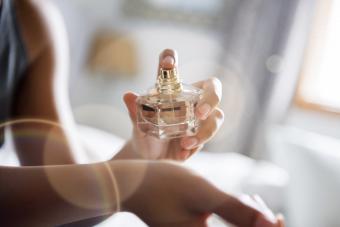
Most women have thought, at some point or another, "How does waterproof mascara work?" Advertisements for waterproof makeup are everywhere; makeup that won't rub or come off, mascara that can last through weddings, lipstick that stays fresh though dinner and dancing.
Women all know that on hot, humid, ninety degree days, when their hair is frizzy and their clothes are sticking to their bodies, that the odds of the mascara they expertly applied earlier in the morning has little chance of remaining that way! The only salvation on days like these is to either not wear any mascara at all (which is impracticable for most) or to reach for the waterproof variety. Most savvy women know that the best choice is the latter. This cosmetics' ability to remain consistent on lashes may lead many to marvel and wonder, "How does waterproof mascara work anyway?" The answer? There's science behind the beauty.
How Does Waterproof Mascara Work Anyway?
Waterproof mascara is able to adhere to lashes, and stay smooth and soft; thanks to a chemical called dimethicone copolyol (this is a form of dimethicone, which is used in many regular cosmetics). Many of the waterproof mascaras are also silicone based (this product is also used in many hair shampoos, conditioners and serums).
Note, however, that many of the ingredients that go into making waterproof mascara is a closely guarded secret, and while scientists may keep this information close to their vest, there are a few factors one can know for sure.
First on that list is the actual definition for dimethicone copolyol. Dimethicone copolyol is a derivative of silica and it acts as an emollient and a water repellent to add shine to the hair and makeup products it's apart of. This advantage is why one finds this chemical in shampoos and conditioners.
Digging deeper into the science, one can see that silicone compounds are inherent to the integrity of waterproof mascara. In fact because both dimethicone copolyol and silicone are fat based, water won't mix or interfere with the product (oil and water don't mix!). Therefore, water literally rolls right off, leaving the product intact; exactly what it's supposed to do in the face of those humid days!
One current waterproof mascara that is pending patent registration has the following chemical breakdown:
| Ingredient | Ratio |
| Carnauba Wax | 5.0 |
| Micro Crystalline Wax. | 4.0 |
| Silicone Resin (MQ Resin) | 3.0 |
| Silicone Compound | I10.0 |
| Dextrin Fatty Acid Ester | 5.0 |
| Denatured Clay Mineral | 2.0 |
| Proplene Carbonate | 0.6 |
| Silicic Acid Anhydride | 1.0 |
To be clear, this chemical breakdown is from US Patent 6759031, and it shows that silicone, which one now knows is inherent to waterproof mascara (via dimethicone copolyol), remains an integral part of the cosmetic process.
Potential Side Effects
There are limited side effects to dimethicone copolyol, but there are a few factors worth noting. Some of these factors include:
Eyelid Dermatitis
If you suffer from eyelid dermatitis (an allergic reaction to compounds that encounter the skin) then stay away from waterproof cosmetics. Eyelid dermatitis often appears as a rash or puffiness on the eyelids and the surrounding area. As such, waterproof cosmetics may only further aggravate an existing condition.
Special Eye Makeup Removers
Most waterproof cosmetics require special solvents to remove. Note that these makeup removers also remove sebum; an oily substance produced by the skin that is designed to be a boundary between your skin and chemicals, irritants and pollutants.
When it comes to your lashes, you'll want to proceed carefully (lashes are notoriously delicate, and can break or fall of quite easily), and purchase removers that are specifically designed to combat waterproof mascaras.
Skin Irritations
Scarily enough, when sebum is removed, the skin can become vulnerable to infection, and sunburns. Moreover, the continual removal of sebum can lead to usually dry skin, which in turn, may lead to premature aging and wrinkles. The eye area is extremely delicate, tugging and pulling around this area can cause wrinkles.Another side effect of using waterproof mascara is that many of them also contain silicone. To fully understand the effects of silicone on the eyes (or around the eye area), it helps to know that silicone is like a form of plastic. Now image that you took plastic, wrapped your eyes in it, and went about your day.
Risk of Acne
Over the course of that day, it would be normal to perspire a bit. Therein lies the problem. That perspiration now has no place to go and is now trapped against your skin!Over time, this can lead to clogged pores that can eventually result in pimples, blackheads, and bumps. Many of us see this when we begin to wear makeup consistently or when we begin using certain anti-aging products; all of a sudden, we find ourselves in the full throes of adult acne.
To Sum Up
Clearly, the answer to "How does waterproof mascara work?", lies in its chemical composition, and while there are a few slight risks associated with that chemical composition, its not enough to cause concern. In short, choosing waterproof mascara is a great choice during the long, hot, humid summer months.







